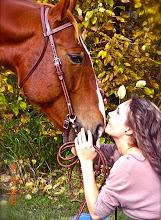For the blog post we have been asked to do on a topic of our choice, I chose to do horse acupuncture. I was recently in a car accident that required me to get physiotherapy, chiropractic work, and acupuncture. I had always been curious about acupuncture, and being an individual that is not scared of needles, I was more than willing to give this method of therapy a try, even if just for the experience. Acupuncture is an ancient Chinese medicinal technique that involves inserting long thin needles into specific points all over the body. As my doctor explained it, the Chinese believe that the human body is a network of connections and electrical circuits that are all interrelated and can become blocked, or there is an incorrect flow of
qi through the body's channels. My doctor was treating me for headaches, but put needles on the tops of my feet, the insides of my calves, and the tops of my hands! The feeling of acupuncture is one that is hard to describe. I was shocked at how these thin little needles could produce such a reaction inside my body. The point of the needles are to release endorphins at the insertion site. When I had needles in my back, it was very painful to move or contract the muscles they were in, so one must lie very still. Your muscles get very heavy and stiff while they are in, but this wears off. When my doctor put needles at my temples, I experienced a huge surge of very sharp pain that lasted a few minutes, but also eventually wore off. I do not mean to scare people who are contemplating acupuncture, it was definitely beneficial and a very cool experience. I almost never get headaches anymore, and the pros more than outweigh the cons. I would recommend it to anyone experiencing chronic pain, injuries, or migraines.
So, because of my experience, it got me thinking of animal acupuncture. I have heard that acupuncture on horses is a big up-and-coming industry, as it is a relatively simple way to ease back pain and treat injuries on such large animals. After doing some research on equestrian acupuncture, I have found that there are 5 basic types of acupuncture. There is Simple Needling, which is what I received with the long thin needles. There is Electroacupuncture, which is where the inserted needles are hooked up to an electrical circuit to further stimulate the problem area. There is Moxibustion, which is when a smoldering cigar of herbs is held above the acupuncture site until the heat becomes uncomfortable, it is removed for a short time, then reapplied. Another is laser stimulation, which is self explanatory, and the last method is Point Injection, where a liquid is injected into the site (usually a vitamin solution). This form of acupuncture provides longer term relief (Horse & Rider, 1999).
 |
| Healthy Veterinary Alternatives (2012). Retrieved April 12, 2012 from http://www.healthyveterinaryalternatives.com/site/view/175317_Horses.pml |
Horse acupuncture is a very detailed process, and explaining it all would far exceed the 4 paragraph limit. But in short, most horses whose owners seek this form of therapy have chronic pain or are suffering from an injury. Most vets recommend acupuncture only after other methods of rehabilitation have been tried and proved to be unsuccessful, as acupuncture is expensive and not many vets are qualified to do it. This method is mainly beneficial for horses whose tissue is constantly becoming more and more damaged with injuries such as a bowed tendon or
laminitis, and in these cases acupuncture can be used along with other conventional treatments. Some owners of prestigious race horses have acupuncture done on their animals. This is done usually for the reason of relieving tension in the horse's back, where the needles are inserted alongside either side of the spine, and in other major muscle groups. The
Stone Willow Veterinary Services are one organization that provide acupuncture on horses in Alberta.
 |
| This is a horse getting Electroacupuncture. De Qi Holistics (2012). Retrieved April 12, 2012 from http://www.deqiholistics.com/what-is-acupuncture/equine-acupuncture-north-carolina-is-acupuncture-painful |
Horse acupuncture is a very cool technique that is slowly becoming more and more popular among veterinarians. Something I would personally be concerned about if I were ever to have acupuncture done on my own horse ties back to that immense discomfort I felt when I got the needles in my back. The heavy sensation along with a sharp pain if the muscle group was moved even slightly would probably frighten most horses, and could end up doing more harm than good. Research about this has shown that most horses are not at all bothered by the needles, and become very relaxed even. Perhaps high strung horses are sedated before given the acupuncture. I hope that this is an area of medicine I can further explore if I get accepted into vet school (fingers crossed!).
 |
| Equisecrets (2012). Retrieved April 12, 2012 from http://www.secrets-of-horse-training-success.com/equine-therapy.html |
I will internally link to
Hayley Kosolofski's blog, simply because she also loves horses and did her Wikipedia article on an topic pertaining to them :)
Reference:
Hayes, K. (1999, February). Equine Acupuncture: Is it for your horse? Horse and Rider.








